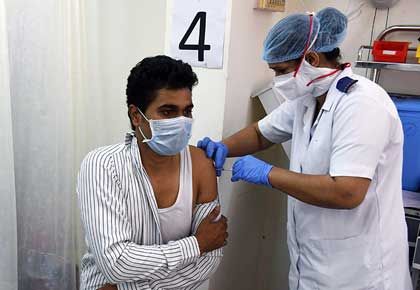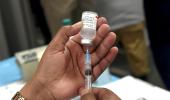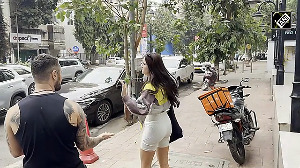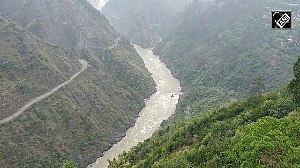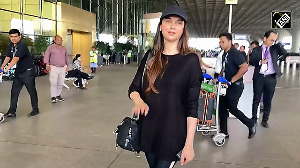'You can still acquire the COVID-19 virus even if you are vaccinated.'
'But if you develop the disease, (after being vaccinated) the likelihood is that it will be mild.'
'It just makes sense to continue to take precautions, because you may be around a lot of unvaccinated people.'
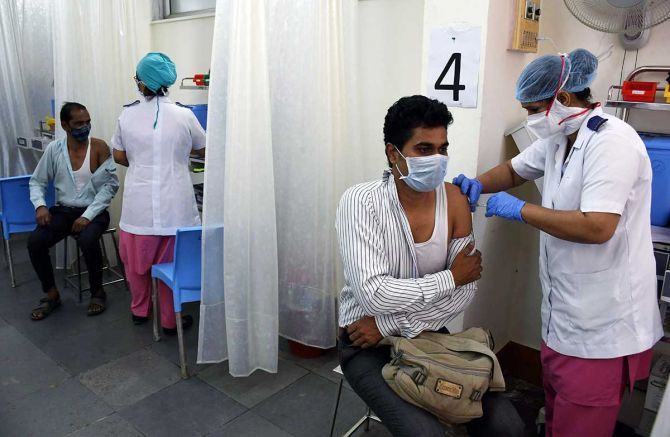
Professor Gagandeep Kang has the most knowledgeable answers to all your relevant questions about COVID-19 vaccines.
If you have a choice, should you opt for Covishield or for Covaxin?
After how many weeks should you take the second dose of the Serum Institute of India-produced Covishield vaccine?
After how many weeks should you take the second dose of the Bharat Biotech and ICMR-produced Covaxin vaccine?
How will your life normalise -- or not -- after two rounds of either the India-produced COVID-19 vaccines?
Which vaccine is better?
Dr Kang -- who has many years of experience working on vaccines and their trials for cholera, rotavirus, typhoid, is the Wellcome Trust Research Laboratory's professor of microbiology at the Christian Medical College, Vellore, co-author of Till We Win: India's Fight Against The Covid-19 Pandemic and is the first Indian woman scientist to be elected a Fellow of the Royal Society* -- crisply and succinctly, as is her style, clears up critical doubts on vaccine issues.
The first of a multi-part interview with Vaihayasi Pande Daniel/Rediff.com:
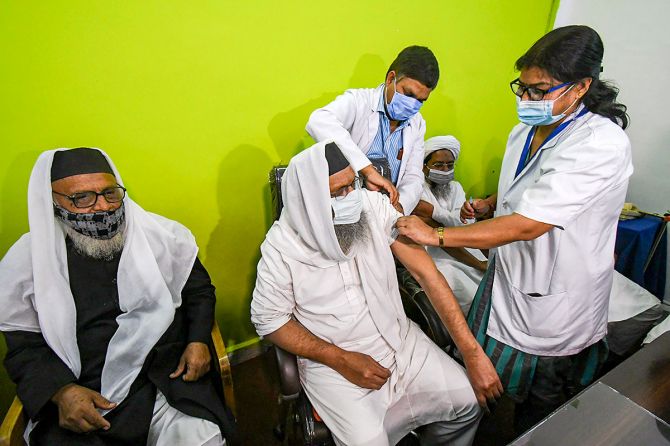
In a recent interview with Mr Karan Thapar, aired on TheWire.com, you said that the second dose of the Covishield vaccine, the Oxford-Astra Zeneca vaccine locally produced by the Serum Institute of India, should be taken, as per the WHO recommendation, after eight to 12 weeks and not 28 days to six weeks as announced by the government of India.
Why?
WHO's decision (to suggest an eight to 12 week interval, for the AstraZeneca vaccine) was based on basically three sets of data.
When Astra Zeneca's vaccine was being developed (as protection against SARS-CoV-2, the virus that causes COVID-19) it was originally planned as a single-dose vaccine.
They were planning to do some studies -- one-dose and then two-dose.
They recruited people for the single-dose study and they recruited people to whom they gave the second dose.
When they gave the second dose, they figured out that the immune response got better with the second dose.
So, they decided to switch to a two-dose schedule.
Now, they already had people in the study, who had been given a single dose.
So, they went back to those people and said: 'Do you want to take the second dose?'
Some said 'Yes', some said 'No'.
Therefore, you have some people who had only one dose of the vaccine (in this study).
When they started the two-dose study, they had some delays, because it wasn't planned as a two-dose study.
They needed an increased number of doses to be available.
They didn't have enough manufacturing going on.
So they had contracted another company to do the manufacturing.
That resulted in delays in getting the second dose out to the people (in the two-dose study).
You wound up in a situation where: People got the second dose of the vaccine, either, not at all (the ones who enrolled only in the first single-dose study).
Or they got it late, which is the people enrolled in the two-dose study, who got the second dose relatively late.
Later in the two-dose study, as doses became more easily available, the time (difference between the vaccine doses) went back to what they had proposed in their protocols.
So, you had people who had got the second dose in varying time intervals and three sets of data.
One set of data shows you that if you had one dose of the AstraZeneca vaccine, you have 70 per cent efficacy for up to three months -- because that's the period of time for which it was measured.
The second piece of data (was generated) because they had dosing issues, and they had variable intervals between the doses -- so you had less than six weeks, then you had six to eight weeks, eight to 12 weeks and a small number beyond 12 weeks, so we'll ignore that.
But between six and 12 weeks, if you look at the interval, the longer the interval the better the immune response.
Then, even though immune response does not necessarily indicate protection, they saw the same thing with protection also.
The longer the intervals, the better the protection against the (COVID-19) disease, going up to 80 per cent at 12 weeks.
Basically, what this tells us is it's not unsafe to delay the second dose.
And there's a reasonable chance that delaying the second dose will give us better efficacy.
That can really matter, because you have then a vaccine that is based on 60 per cent efficacy versus one that has 80 per cent efficacy.
It can be a huge difference at the population level.
It can have a real impact on the disease.
That's the basis on which WHO made the recommendation that vaccine second doses should be delayed to eight to 12 weeks.
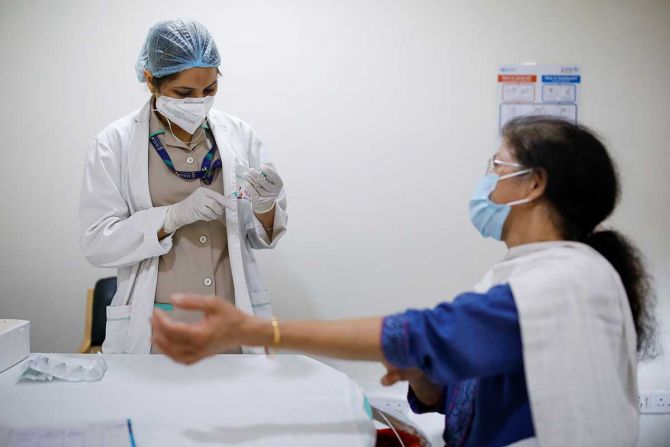
You said, in the same interview, that the longer gap between doses of Covishield was not happening in India, because the Government of India was still recommending that we have a shorter gap, between doses of this particular vaccine, at the moment.
And if the gap is changed, you said it 'becomes something which is called off label'.
What did you mean by off-label use?
When you go to a (government drug) regulator and you ask for permission to sell a product, or to get approval for that product, in a country, you say: 'My company is making this product, for this purpose, and this is how we think it should be (the form it should exist in or be administered)'.
The regulator looks at this information and says: 'This is appropriate.
This is how the drugs or vaccine or whatever should be (the form it should exist in or be administered)'.
Right now, the product that we have (ie Covishield) is not a licensed product.
It's a restricted-use product and the (Indian) regulator has said that the products will be used between four and six weeks.
And that the second dose should be given between four and six weeks.
They are basing this on the fact that in India, we have only done an immunogenicity** study only at four to six weeks.
Based on that they are saying that this product must be used in that way (time frame).
This information is usually included in the approval that the regulator provides, and if you decide that you're going to use this drug in anything other than the language approved by the regulator, it's called off-label use.
So, there is information on the label.
But you are not using that information.
You are using information that is off the label.
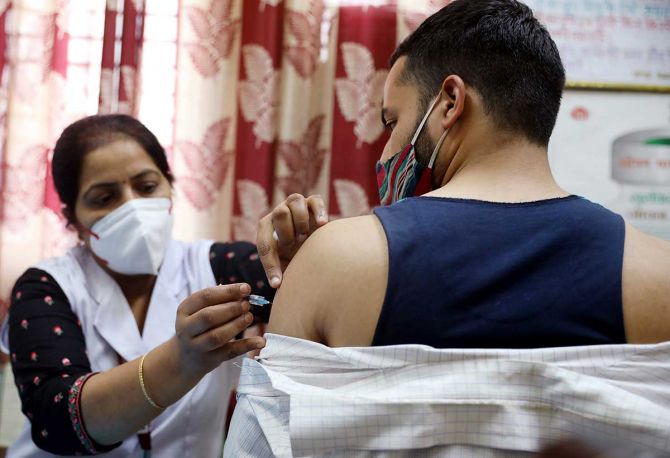
May I ask some details about Covaxin?
The second dose of Covaxin, on the other hand, however should be given after a 28-day gap?
Correct?
Sure.
Yes.
Protection (against COVID-19) from Covaxin is (kicks in) two weeks after second dose.
When they started administering Covaxin in India in early January, there was a lot of speculation because the Phase III trial data had not been released and they were giving it to essential workers across the country.
About 15 days ago (March 3, 2021) they announced, that based on the data collected for the Phase III trial, from the inoculations done since January, that it had 81 per cent efficacy.
As a vaccine scientist if you were to compare both vaccines -- you had mentioned that your mom had taken Covaxin and you took Covishield -- and if one had a choice, which is not always so, which one should one take?
It doesn't make a difference.
Both of them work.
A lot of companies put out 60 per cent, 70 per cent. 80 per cent, 90 percent (vaccine efficacy data)... One thing that's important to remember is that clinical trials are very dependent on the design of the study and the outcome that they are measuring.
If one company defines the (COVID-19) disease as RT-PCR positive, fever and one other symptom, and another company defines the disease as RT-PCR positive, and any symptom, those are two very different things.
You cannot just take a number and say this vaccine is better or worse.
Right now, we have no data to say.
We do know that both vaccines work to prevent the disease.
And, I think, either vaccine is fine.
In Europe and the UK, as it gets over the clotting scare, since the vaccine has again been declared safe by WHO, are they also giving the second dose of AstraZeneca after eight to 12 weeks?
In the UK, the recommendation was 12 weeks from the start.
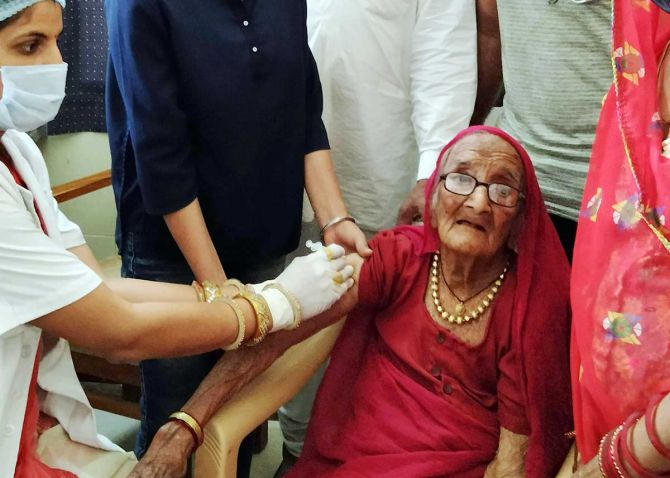
Last year in an interview to me, you said: "Please note, life after a vaccine won't be normal."
Supposing one is a senior citizen, who has now gone through, let's say two doses of Covaxin or two doses of Covishield, without the required gap that you're suggesting, what can I now do cautiously and in what manner?
A person who has been vaccinated with two doses of any vaccine is likely -- likely, not guaranteed -- to be protected against severe disease (episode of COVID-19) and not necessarily against mild disease and not against infection (getting COVID-19).
You can still acquire the COVID-19 virus even if you are vaccinated.
But if you develop the disease, (after being vaccinated) the likelihood is that it will be mild.
It just makes sense to continue to take precautions, because you may be around a lot of unvaccinated people.
If you are interacting with only vaccinated people, the chances of disease spreading are much lower.
But if you are interacting with un-vaccinated people, then continue to be cautious.
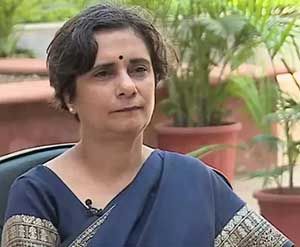 IMAGE: Dr Gagandeep Kang
IMAGE: Dr Gagandeep KangSo like the US Centre for Disease Control announced a few days ago, seniors who have all gotten their two doses could meet, technically, in safe places?
Yes.
It's really important to remember about the (COVID-19) disease is: Your immediate environment reflects the risk in your wider environment.
Let's say you are in New Zealand and you've gotten the vaccine.
You will feel pretty safe, right?
If you are in Brazil, and you've gotten the vaccine, there's still a lot of virus around.
So, you should be careful.
It's a measure of how much viruses are circulating in the larger environment around you and that should determine how much care you need to take.
If there is very little virus around, and everybody's vaccinated, then that's a pretty safe place to be.
If you are vaccinated, but many people around you are not, and there are high levels of virus circulation, it is still important to be careful.
And wear a mask?
Absolutely.
*The oldest independent scientific academy in continuous existence since 1660 and being made a fellow, according to a Wikipedia reference, is an award granted by the judges of the Royal Society of London to individuals who have made a 'substantial contribution to the improvement of natural knowledge, including mathematics, engineering science, and medical science'.
**'Immunogenicity-- is a more complex measure of how well a vaccine works, and measures the type of immune responses that the vaccine generates and their magnitude over time' as per astrazeneca.com, which references the scientific paper: Hodgson, S et al.
What defines an efficacious COVID-19 vaccine?
A review of the challenges assessing the clinical efficacy of vaccines against SARS-CoV02. 2020.
- PART II: Why are COVID-19 cases increasing?
Feature Presentation: Ashish Narsale/Rediff.com
